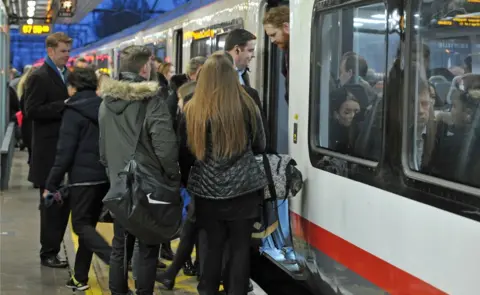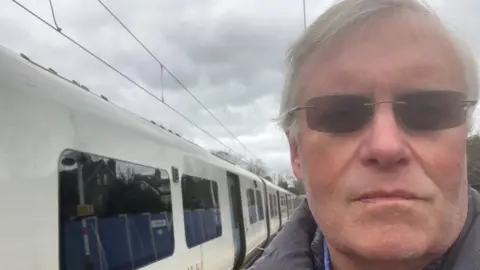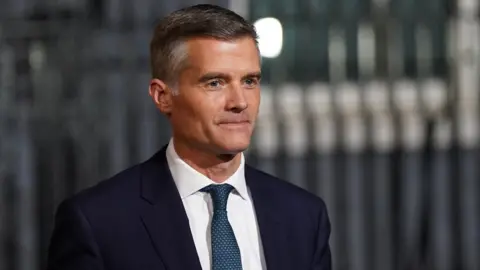Cost of living: How do rail commuters feel about increased prices?
 PA Media
PA MediaAs rail fares increase by up to 5.9%, what are the thoughts of those who commute by train and will they still continue to choose to travel by rail?
Regulated rail fares in England are going up by an average of 5.9% from today.
Rail Minister, Huw Merriman, says: "I understand it has been a difficult year and people are feeling the pinch which is why - through the biggest ever government intervention - we capped the rise well below inflation and delayed it coming into force."
Labour has called the hike - which is the second highest on record - "a sick joke".
What do passengers think and do they feel they are getting value for money?
'Driving is now cheaper'
 Susanna Stidson
Susanna StidsonSusanna Stidson says she will now be opting to drive instead of using the train as it is more cost effective.
She says she travels from her home in Pitsea to work in Romford, London two days a week on C2C Rail.
However, now her ticket has gone up from £15.20 to £16.10, parking all day in Romford for £10 is the more affordable option.
"Driving is now cheaper," says the 49-year-old, who works in banking.
'It's still helping the environment'
 Bethan Everson
Bethan EversonWhile Bethan Everson, who commutes between Ely and Cambridge two to three times a week, feels the benefits of travelling by train still outweigh the increase in prices.
The 31-year-old researcher says: "I will still travel by train, as it means I can run to/from the station, be outside, get fresh air, all while helping do my bit for the environment via reducing another car on the road.
"Plus, if you directly compare train travel versus the cost of owning, maintaining a vehicle, running costs, it's all expensive these days."
She adds: "The positive spin on trains is that at least you know you're helping the environment, without the stress of owning a vehicle necessarily, and you never know, you might have some friendly train conversation with other people on your commute.
"I certainly have met friendly people and seen friends on the way to and from work, which I love."
'Disappointing that fares are to increase'
 Neil Middleton
Neil MiddletonNeil Middleton, from Harpenden, used to commute into Canary Wharf, and says he is pleased he no longer has to make the journey due to the increase.
He still regularly uses the trains and is now part of the Rail Campaign Group.
He used the train this weekend and said instead of buying a ticket on the day he purchased one in advance to avoid the increase.
"At a time when the service frequencies are being reduced, rather than increased - stations like Leagrave and Flitwick will lose 50% of their service at times in the evening from May, it is disappointing that fares are to increase.
"Whilst we understand the need for rail revenue to increase, a focus on extracting ever more money from current travellers seems to forget that persuading more to travel by train through better value and a more usable train service (frequent and reliable) has much more potential for reducing the gap between costs and income."
'Fair balance'
 PA Media
PA MediaThe government says it has acted with the "biggest intervention in its history" to ensure rail fare increases for 2023 are capped at 5.9%.
Before the Covid pandemic, fares were raised in January each year, based on the retail prices index (RPI) measure of inflation from the previous July.
Inflation is the rate at which prices rise, and the normal formula for fares is RPI plus 1%.
However, the government says "for this year only" rail fare increases for 2023 would be capped 6.4 percentage points below July's RPI figure of 12.3%.
Like last year, it also froze fares for January and February, so passengers could have more time to buy tickets at the existing prices.
Transport Secretary Mark Harper said the rise represented a "fair balance" between passenger and taxpayer needs, and described the move as "the biggest ever government intervention in rail fares".

Find BBC News: East of England on Facebook, Instagram and Twitter. If you have a story suggestion email [email protected]
